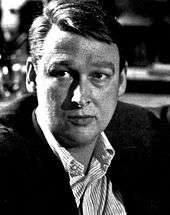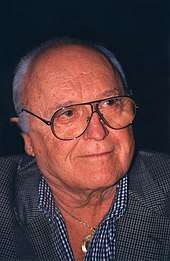40th Academy Awards
The 40th Academy Awards honored film achievements of 1967. Originally scheduled for April 8, 1968, the awards were postponed to two days later, April 10, 1968, because of the assassination of civil rights leader Martin Luther King Jr. Bob Hope was once again the host of the ceremony.
| 40th Academy Awards | |
|---|---|
 Official poster with original date | |
| Date | April 10, 1968 |
| Site | Santa Monica Civic Auditorium, Santa Monica, California |
| Hosted by | Bob Hope |
| Produced by | Arthur Freed |
| Directed by | Richard Dunlap |
| Highlights | |
| Best Picture | In the Heat of the Night |
| Most awards | In the Heat of the Night (5) |
| Most nominations | Bonnie and Clyde and Guess Who's Coming to Dinner (10) |
| TV in the United States | |
| Network | ABC |
Due to the increasing rarity of black and white feature films, the awards for cinematography, art direction and costume design were combined into single categories rather than a distinction between color and monochrome. The Best Picture nominees were an eclectic group of films reflecting the chaos of their era. The event was the first one since the 1948 awards show to feature film clips from the Best Picture nominated films.
This year's nominations also marked the first time that three different films were nominated for the "Top Five" Academy Awards: Best Picture, Director, Actor, Actress and Screenplay. The three films were Bonnie and Clyde, The Graduate and Guess Who's Coming to Dinner. However, the winner of Best Picture was producer Walter Mirisch and director Norman Jewison's thriller/mystery film, In the Heat of the Night (with seven nominations and five wins – Best Picture, Best Actor, Best Screenplay, Best Film Editing and Best Sound).
The Graduate is, as of the 92nd Academy Awards, the last film to win Best Director and nothing else.
Due to an all-out push by Academy President Gregory Peck, 18 of the 20 acting nominees were present at the ceremony. Only Katharine Hepburn and the late Spencer Tracy, who was nominated posthumously, were missing.
Winners and nominees
Nominations were announced on February 19, 1968. Winners are listed first, highlighted in boldface and indicated with a double dagger (![]()
Jean Hersholt Humanitarian Award
Irving G. Thalberg Memorial Award
Honorary Oscar
Arthur Freed was presented for distinguished service to the Academy and the production of six top-rated Awards telecasts.
Trivia
- This was the last Oscars broadcast by network radio in the US. The ABC radio network (which had just split into four separate services) carried the ceremony over the ABC Entertainment network.
- Of the 20 performers nominated in the acting categories only two didn't attend: Katharine Hepburn, whose award for Best Actress was accepted by George Cukor, was in France filming The Lion in Winter, and Spencer Tracy, whose nomination was posthumous.
- There was no Governor's Ball.
- Prior to the two-day postponement, four African-American stars who were scheduled to take part in the ceremony: Sidney Poitier, Sammy Davis Jr., Louis Armstrong, and Diahann Carroll, announced they were withdrawing in mourning for Dr. King. Prior to the postponement, Jack Lemmon was announced as a replacement for Poitier, and Shirley Jones for Davis, but once the event was delayed, the original quartet returned.
- Alfred Hitchcock's acceptance speech is on record as one of the shortest in Academy Awards history: "Thank you very much indeed". This is one word longer than William Holden´s acceptance speech for Stalag 17 at the 26th Academy Awards, which was simply "Thank you ... thank you."
- This was the only year in which two films (Bonnie and Clyde and Guess Who's Coming to Dinner) received nominations in all four acting categories.
- Legendary film composer John Williams received his first nomination for scoring Valley of the Dolls. He would go on to receive 50 more nominations, winning 5.
Multiple nominations and awards
|
These films had multiple nominations:
|
The following films received multiple awards.
|
Presenters and performers
The following individuals, listed in order of appearance, presented awards or performed musical numbers.
Presenters
| Name | Role |
|---|---|
| Hank Simms | Announcer for the 40th Academy Awards |
| Gregory Peck (AMPAS President) | Gave opening remarks welcoming guests to the awards ceremony |
| Bill Miller | Explained the eligibility and voting rules to the public |
| Carol Channing | Presenter of the award for Best Sound |
| Patty Duke | Presenter of the award for Best Supporting Actor |
| Dustin Hoffman Katharine Ross | Presenters of the award for Best Cinematography |
| Macdonald Carey Diahann Carroll | Presenters of the Short Subjects Awards |
| Robert Morse Barbara Rush | Presenters of the Documentary Awards |
| Eva Marie Saint | Presenter of the award for Best Costume Design |
| Bob Hope (host) | Presenter of the Honorary Award to Arthur Freed |
| Natalie Wood | Presenter of the award for Best Special Visual Effects |
| Richard Crenna Elke Sommer | Presenters of the award for Best Sound Effects |
| Walter Matthau | Presenter of the award for Best Supporting Actress |
| Edith Evans | Presenter of the award for Best Film Editing |
| Rosalind Russell | Presenter of the Jean Hersholt Humanitarian Award to Gregory Peck |
| Danny Kaye | Presenter of the award for Best Foreign Language Film |
| Rock Hudson Shirley Jones | Presenters of the award for Best Art Direction |
| Bob Hope | Presenter of the Academy Awards' history montage |
| Angie Dickinson Gene Kelly | Presenters of the Music Awards |
| Barbra Streisand | Presenter of the award for Best Song |
| Sammy Davis Jr. | Accepted Leslie Bricusse's award on his behalf |
| Robert Wise | Presenter of the Irving G. Thalberg Memorial Award |
| Leslie Caron | Presenter of the award for Best Director |
| Claire Bloom Rod Steiger | Presenters of the Writing Awards |
| Audrey Hepburn | Presenter of the award for Best Actor |
| Sidney Poitier | Presenter of the award for Best Actress |
| Julie Andrews | Presenter of the award for Best Picture |
Performers
| Name | Role | Performed |
|---|---|---|
| Elmer Bernstein | Musical arranger and conductor | Orchestral |
| Louis Armstrong | Performer | "The Bare Necessities" from The Jungle Book |
| Lainie Kazan | Performer | "The Eyes of Love" from Banning |
| Sérgio Mendes Brasil '66 | Performer | "The Look of Love" from Casino Royale |
| Sammy Davis Jr. | Performer | "Talk to the Animals" from Doctor Dolittle |
| Angela Lansbury | Performer | "Thoroughly Modern Millie" from Thoroughly Modern Millie[2] |
| Academy Awards Orchestra | Performers | "Hooray for Hollywood/There's No Business like Show Business" (orchestral) during the closing credits |
See also
- 1967 in film
- 10th Grammy Awards
- 19th Primetime Emmy Awards
- 20th Primetime Emmy Awards
- 21st British Academy Film Awards
- 22nd Tony Awards
- 25th Golden Globe Awards
- Rose Weiss, costume designer for the 1968 awards
References
- "The 40th Academy Awards (1968) Nominees and Winners". oscars.org. Archived from the original on 2014-11-03. Retrieved 2011-11-10.
- Angela Lansbury performing "Thoroughly Modern Millie" on show on YouTube
External links
- 40th Academy Awards on IMDb
- A Place to Stand, 1967, Archives of Ontario YouTube Channel (winner of Best Live Action Short Subject)



.jpg)